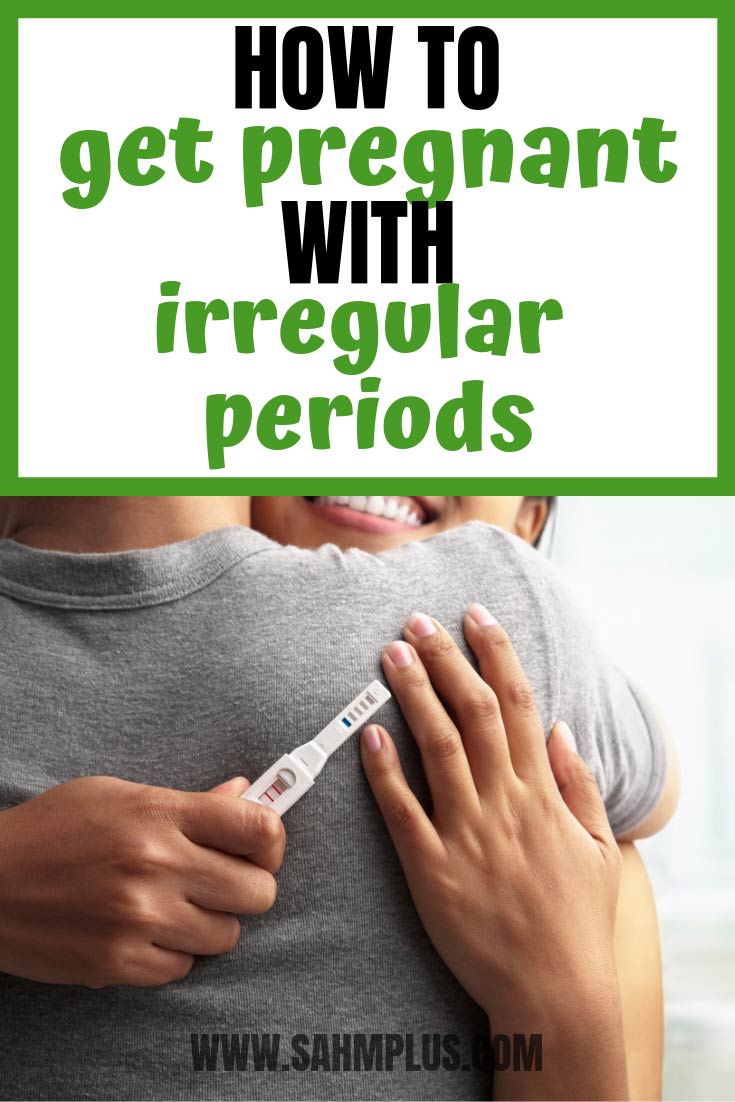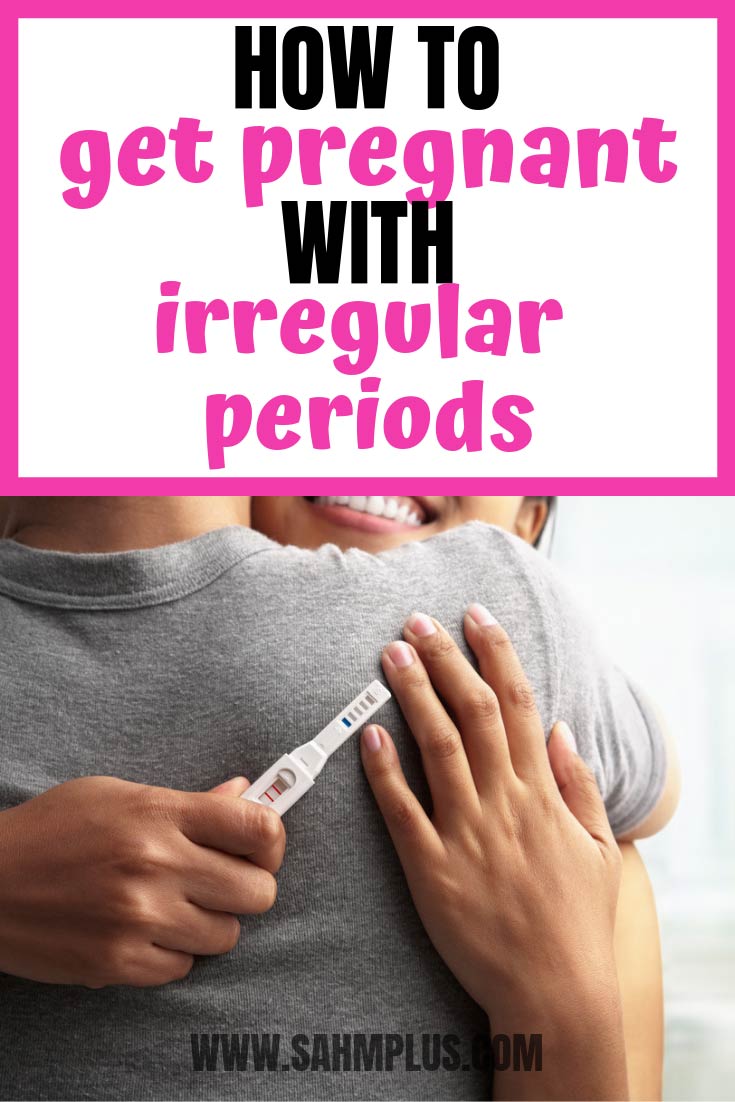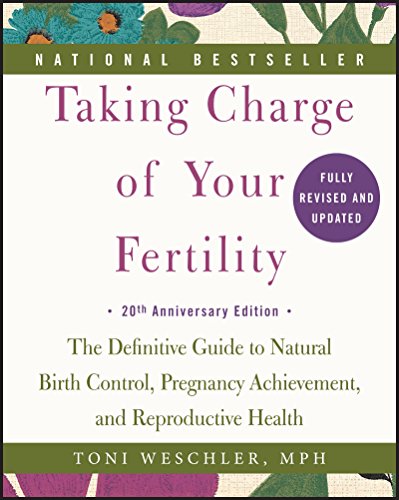Do you have irregular cycles? When it comes to your fertility, you may be wondering how to get pregnant with irregular periods. These tips may help.
If you’re wondering how to get pregnant with irregular periods, your first line of defense is maybe to seek medical advice.
While not exactly a bad choice, that can certainly become a costly endeavor that maybe could have been handled at home.
Really, if you’re trying to conceive with irregular menstrual cycles, you may choose to do some home research first. This can save you from expensive doctor bills and teach you more about the female body than your high school Sex Ed class could ever dream of.
In truth, learning more about your own body is never a bad thing anyway.

What Is An Irregular Period Anyway?
First thing first, let’s get to know what an irregular period is.
According to the Office of Women’s Health, an irregular period is any cycle that is less than 24 days or more than 38 days.
This is something I struggled with trying to conceive my first baby. My cycles were often longer than 38 days (and I could go a couple months without a period), but had been that way since I was a teenager. So, I assumed my irregular periods were normal until I had difficulty conceiving.
Common Causes of Irregular Periods
Irregular periods can be caused by various factors, including:
- Hormonal Imbalances: Fluctuations in hormone levels, particularly estrogen and progesterone, can disrupt the normal menstrual cycle, leading to irregular periods. Conditions such as polycystic ovary syndrome (PCOS), thyroid disorders, and adrenal gland disorders can contribute to hormonal imbalances.
- Stress: High levels of physical or emotional stress can affect the hypothalamus, pituitary gland, and adrenal glands, leading to changes in hormone production and menstrual irregularities.
- Extreme Weight Changes: Significant weight loss or gain can impact hormone levels and disrupt the menstrual cycle. Low body weight or excessive exercise can lead to the suppression of reproductive hormones, while obesity can result in increased estrogen production, both of which can cause irregular periods.
- Eating Disorders: Conditions such as anorexia nervosa or bulimia can lead to hormonal imbalances, malnutrition, and significant weight fluctuations, all of which can contribute to irregular menstrual cycles.
- Medical Conditions: Certain medical conditions, such as endometriosis, uterine fibroids, pelvic inflammatory disease (PID), and ovarian cysts, can interfere with the normal functioning of the reproductive system, leading to irregular periods.
- Medications: Certain medications, including hormonal contraceptives, anticoagulants, and some chemotherapy drugs, can affect hormone levels and disrupt the menstrual cycle, resulting in irregular periods.
- Perimenopause: As women approach menopause, the natural decline in reproductive hormones can cause irregular menstrual cycles, including changes in the frequency and duration of periods.
- Thyroid Disorders: Thyroid imbalances, such as hypothyroidism or hyperthyroidism, can affect the production of reproductive hormones, leading to menstrual irregularities.
- Excessive Exercise: Intense or excessive physical activity, particularly endurance training or rigorous workouts, can disrupt the balance of reproductive hormones and result in irregular periods.
- Chronic Illness: Certain chronic conditions, such as diabetes and autoimmune disorders, can impact hormone regulation and contribute to irregular menstrual cycles.
Understanding these common causes can help individuals identify potential factors contributing to their irregular periods (and infertility) and seek appropriate medical guidance and treatment when necessary.
Can You Get Pregnant With Irregular Periods?
While it’s not considered impossible, irregular menstrual cycles can make becoming pregnant difficult. Because a woman with irregular periods still ovulates, she can still get pregnant. But, her ovulation can be tough to track because it’s not on a predictable schedule.
Really, irregular periods and pregnancy aren’t a great match for many reasons.
How To Get Pregnant With Irregular Periods: Home Remedies
So, let the research begin and look for articles written by other women who have successfully gotten pregnant with irregular periods.
Understand, if you’re looking for how to get pregnant with irregular periods fast, you’re in for a rude awakening. This does take some work and learning about your body. Sometimes, learning what your body needs and can take some time. But, you may find underlying health issues that you can fix, making a pregnancy easier down the road!
From my personal experience, much of it had to do with my hormones being out of balance. I did things at home to fix that.
So, here’s a list of ways to get pregnant when you have irregular periods:
1. Load Up On Fertility Information
Borrow a few natural fertility books from the library or buy a few online or in a store.
My favorite in-depth fertility tracking book was Taking Charge of Your Fertility. This book taught me so much about women’s cycles, tracking periods, and what everything meant.
- Weschler, Toni (Author)
- English (Publication Language)
- 560 Pages – 07/07/2015 (Publication Date) – William Morrow Paperbacks (Publisher)
Secondly, I loved the book Making Babies: A Proven 3-Month Program for Maximum Fertility. After doing a personal quiz, this book helped me determine how to eat for my body type in order to achieve pregnancy. I did get pregnant 2 months after using the recommendations in this book, however, I had also been trying a variety of things to balance my hormones prior to getting my hands on this book.
- Hardcover Book
- David, Sami S. (Author)
- English (Publication Language)
- 384 Pages – 08/12/2009 (Publication Date) – Little, Brown and Company (Publisher)
Have you been dealing with infertility for some time? Learn about your infertility root cause through the Pregnancy Miracle Program.
2. Don’t Stress It
According to Web MD, stress can hurt your chances of getting pregnant. So, practice some self-care and try not to make your entire focus on getting pregnant.
I know it’s easier said than done, but it’s important to continue to live your life like normal. Plus, your spouse will appreciate the time you guys have a lot more if you’re still showing him that you love him. And living life (and having sex) isn’t just about getting pregnant.
Some simple ways to reduce stress are to:
- Cut out caffeine
- Try yoga or meditation
- Read (at least 6 minutes per day)
- Light exercise
- Seek counseling, therapy, or support groups
3. Eat Healthily
As I learned while reading the Making Babies book, eating a healthy diet isn’t just something we should be doing for our overall health, but for the benefit of our body’s hormones and conception. Plus, a healthy diet is highly recommended during pregnancy anyway.
4. Period Tracking
As I learned in Taking Charge of Your Fertility, period tracking is a great way to learn about your overall cycle health. Here, you’ll begin to see your body’s routines and start getting a feel for each phase in your cycle.
5. Basal Body Temperature Checking
This, again, is covered in the Taking Charge of Your Fertility book.
Tracking your basal body temperature (and cervical mucus) will help you predict ovulation.
6. Are Your Hormones Out Of Whack?
Generally speaking, irregular periods (as defined above) are usually the result of hormone imbalance.
While I recommend doing tons of research and consulting with your physician before taking any supplements, I found Vitex (an herbal supplement) to work for me. This herbal supplement helped me to regulate (and shorten) my cycles when following instructions for use to regulate and stopped when it was safe to do so after I found out I was pregnant.
Find a way to balance and regulate hormones (especially after coming off birth control) to ensure your body is working optimally for getting pregnant.
If you’re having trouble getting pregnant with irregular periods, getting your body into shape can also be a great way to regulate hormones.
7. Evaluate Your Workout Routine
Can too much exercise decrease your fertility? Very Well Family mentions that studies have come to different conclusions, but here are a few:
- Strenuous exercise of four or more hours per week may reduce IVF success rates
- Aerobic exercise for seven or more hours per week may increase the risk of ovulation problems
- Vigorous exercise may improve fertility in women who are obese
- Vigorous exercise may decrease fertility in women who are at their normal weight
- Moderate exercise (for more than hour but less than five hours per week) was found to improve fertility in all women
Do you have tips on how to get pregnant with irregular periods?
If you ever struggled with fertility issues because of irregular cycles, what tips would you offer about how to get pregnant with irregular periods?
How to get pregnant with irregular periods was originally published in 2019 on this site and has been updated.




3 comments
Nowadays pcod and pcos are the main problem for womens so this article is very useful for such type of women
Great article, it is very informative. You can also include one more point, i.e get rid of bad habits (smoking, drinking alcohol etc.)
Well, that’s a really great trick!
Comments are closed.